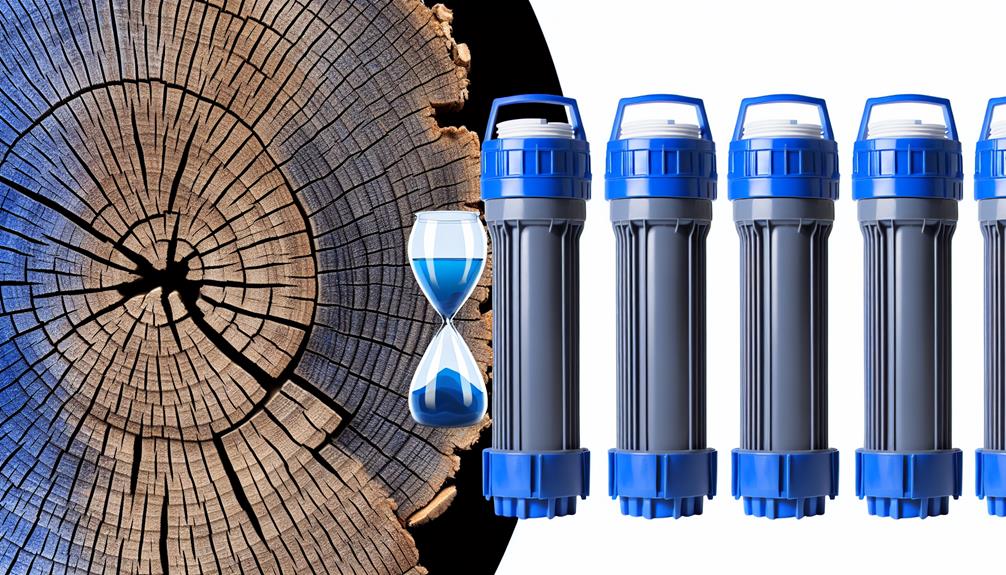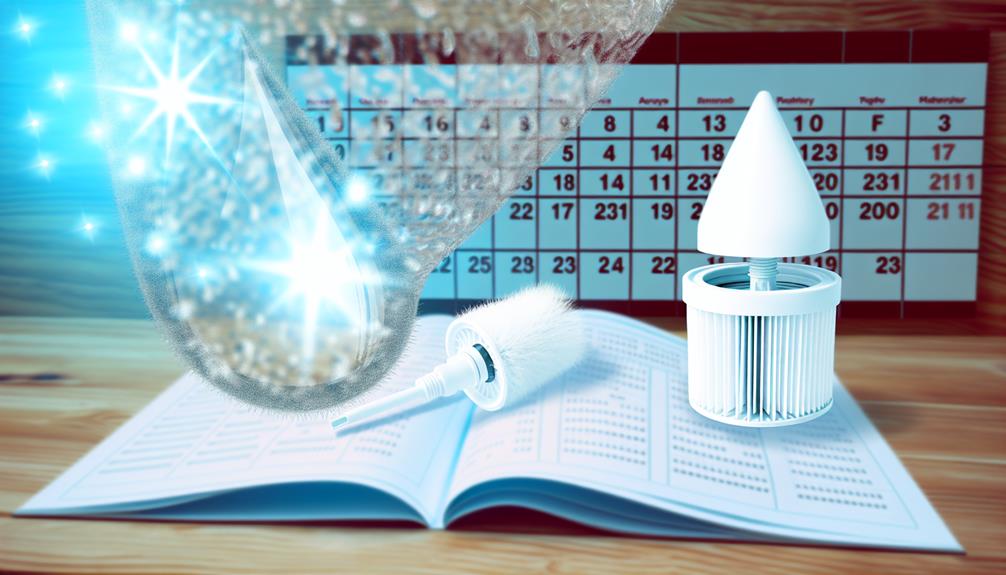Just as a runner feels her pulse quicken when it's time to kick up the pace, your water filter has its own way of telling you it's time for a change.
You're probably familiar with the peace of mind that comes from knowing the water you're drinking is filtered, clear of contaminants and impurities. But what you might not realize is that this invisible shield can wear thin, and without the right attention, it could fail to protect you and your family.
You've noticed the water doesn't taste quite as refreshing, the flow has slowed to a trickle, and there's an odd scent that didn't used to be there. These subtle hints are your cue that it's time to investigate further.
Stay alert to the signs that your water filter isn't performing at its peak, because what you don't know could impact more than just the flavor of your morning coffee.
Unusual Taste or Odor
If you're noticing a metallic taste or a rotten egg odor in your water, it's likely time to replace your water filter. These symptoms are indicative of a compromised water quality, often due to a filter that has reached the end of its functional life.
A metallic taste in your tap water or filtered water is a clear sign that the filter is no longer effectively removing minerals and other contaminants that can affect the flavor of your water.
Similarly, if your water emits an unpleasant odor, such as a musty or moldy smell, this is another red flag that your water filter needs attention. These odors can develop when a filter becomes clogged with organic matter or bacteria, which not only impact the smell but also the safety of the water you consume.
It's crucial to recognize these unusual tastes or odors as signs that your current water filtration system isn't providing the clean, fresh-tasting water it's designed to deliver. To restore the purity of your water, it's essential to install a new one as soon as these signs become apparent.
Regular filter maintenance and timely replacement are key to ensuring optimal water quality.
Decreased Water Flow
While a metallic taste or foul odor hints at the need for a filter change, you'll also want to watch for a decrease in water flow, which is a telltale sign that your filter may be clogged. If you've noticed a significant decrease in water pressure or it's taking longer to fill a glass, it's likely your filter water system isn't performing optimally. Slow flow rate isn't just a minor inconvenience; it can also indicate that contaminants aren't being efficiently removed.
To ensure you're getting the purest water possible, pay attention to these signals:
- Sudden Decrease in Water Pressure: If water trickles out where it once flowed, you should check your water filters.
- Extended Time to Fill Containers: When it takes ages to fill a pitcher, it can indicate it's time to replace the filter.
- Old Filter: Check the manufacturer's recommendations—most filters have a finite lifespan and need to be replaced regularly.
- Inconsistent Water Flow: Variability in flow rate can suggest a clogged filter that needs attention.
- Maintenance Indicator: Some systems have lights or alerts to tell you when your old filter needs to be replaced.
Don't ignore these signs that your water filter system requires maintenance. Regularly replacing your water filter ensures you continue to filter water effectively and maintain a healthy home environment.
Murky or Discolored Water
When your water appears murky or discolored, it's a clear indication that your filter is no longer effectively removing impurities and needs replacement. This change in your drinking water's appearance is one of the telltale signs that indicate a compromised filtration system. Cloudiness or an unusual color, such as red or brown, suggests that the water contains impurities that should have been captured by a functioning filter.
The presence of discoloration in water isn't only unappealing but also a warning sign that potentially harmful contaminants may not be properly filtered out. This is a significant concern for your health and safety, as drinking contaminated water can lead to adverse health effects.
To ensure that your drinking water remains clear and free from contaminants, it's important to promptly replace your water filter upon noticing these changes. Regular maintenance and timely filter replacement are crucial to maintain the quality and safety of your water supply.
Don't ignore these signs; acting swiftly in replacing your water filter will safeguard against impurities and maintain the integrity of your drinking water.
Frequent Filter Saturations
Beyond the visual cues of murky or discolored water, you might also notice more frequent filter saturations, a sign that your system is due for a filter change. When the total dissolved solids and dissolved impurities build up, it's time to replace your water filter to maintain optimal water filtration performance.
Here are key indicators to look out for:
- Metallic taste or unpleasant odors, like a rotten egg smell, suggesting that minerals or sulfur compounds aren't being effectively filtered out.
- A noticeable decrease in water pressure, which can be caused by clogged filter connections due to sediment accumulation.
- The presence of black mold in your filtered water, signaling fungal growth and a compromised filtration system.
- Cloudiness in your water, indicating the presence of small, dissolved pollutants that aren't being adequately removed.
- Your water filter's indicator light, if present, will usually alert you when it's time for a replacement.
Don't ignore these signs of frequent filter saturations. They're clear indications that your current filter is struggling with filtering water efficiently and needs to be replaced to ensure the safety and purity of your drinking water.
Water Filter Indicator Alerts
Your water filter's indicator light serves as a clear signal to alert you when it's time for a filter change, turning green, yellow, or red based on water usage and filter condition. A green light typically signifies that the filter is functioning within optimal parameters.
As you consume gallons of water, the filter collects contaminants like calcium and magnesium, which contribute to hard water. Over time, the indicator may shift to yellow as a warning that the filter's efficiency is declining.
Filters work tirelessly to remove impurities, but they've a finite lifespan. When the light turns red, it's a definitive sign that the filter needs replacement. Ignoring this alert can lead to a decrease in water pressure, often caused by clogged filter connections. Additionally, a metallic taste or an unpleasant odor resembling rotten eggs may develop, suggesting that the filtration is no longer effective against mineral deposition or sulfur compounds.
In extreme cases, the presence of black mold in your filtered water indicates fungal growth, a serious health risk that underscores the urgency for a new water filter. Adhering to these indicator alerts is vital, as detailed in this blog post, to ensure the safety and quality of your water.

